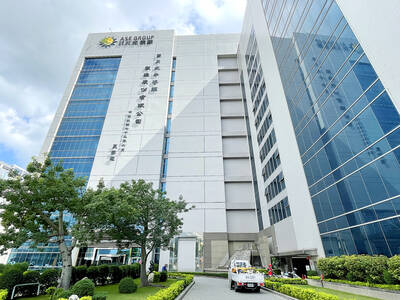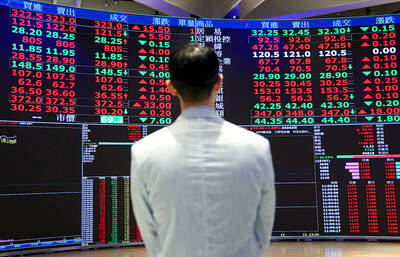The Taiwanese chip industry is expected to experience anemic year-on-year growth of 0.9 percent in production value this year, primarily as demand dwindles amid trade uncertainty and decelerating smartphones sales, the Taiwan Semiconductor Industrial Association’s (TSIA) latest report said yesterday.
The chip industry as a whole is expected to see production value creep up to NT$2.64 trillion (US$85.73 billion) this year from NT$2.62 trillion last year, the association said, citing a forecast by the Industrial Technology Research Institute (ITRI, 工研院).
The latest growth forecast was trimmed from annual growth of 2 to 3 percent estimated previously, the institute said.
The IC industry covers chip design, manufacturing, packaging and testing, with the manufacturing segment accounting for more than 50 percent of the industry’s total production value.
The chip manufacturing sector is to suffer the brunt of the latest downturn as the sector is to post its first annual contraction since 2011 of 0.2 percent in production value to NT$1.48 trillion, the report said.
The chip manufacturing sector is comprised of the foundry and memorychip segments.
“We cut our projection to reflect the adverse impact from world trade uncertainty, and sliding sales of smartphones and PCs globally,” ITRI analyst Jerry Peng (彭茂榮) said by telephone. “Even foundry heavyweight Taiwan Semiconductor Manufacturing Co (TSMC, 台積電) will be affected.”
TSMC last month forecast that its revenue this year would grow 1 to 3 percent year-on-year, but it remains to be seen if the goal can be achieved as the chipmaker has reduced its revenue forecast by US$550 million this quarter due to flawed materials.
The production value of the nation’s foundry segment is to grow by a mere 0.7 percent year-on-year to NT$1.29 trillion, slowing from annual growth of 6.4 percent last year, while the production value of the memorychip segment is to shrink 6.7 percent to NT$18.77 billion after strong growth of 24 percent last year, the institute said.
The production value of the nation’s chip designers is expected to grow 4.1 percent year-on-year, marking the second year of growth since a contraction of 5.5 percent in 2017.
MediaTek Inc (聯發科), the nation’s largest designer of chips for smartphones, said last week that its revenue would be flat or grow slightly this year compared with NT$238.06 billion last year due to stagnant smartphone sales.
However, the nation’s chip industry is expected to outperform the global chip industry, Peng said.
“We are not pessimistic about the nation’s chip industry,” he said.

EXPANSION: The investment came as ASE in July told investors it would accelerate capacity growth to mitigate supply issues, and would boost spending by 16 percent ASE Technology Holding Co (ASE, 日月光投控), the world’s biggest chip assembly and testing service provider, yesterday said it is investing NT$17.6 billion (US$578.6 million) to build a new advanced chip packaging facility in Kaohsiung to cope with fast-growing demand from artificial intelligence (AI), high-performance-computing (HPC) and automotive applications. The new fab, called K18B, is to commence operation in the first quarter of 2028, offering chip-on-wafer-on-substrate (CoWoS) chip packaging and final testing services, ASE said in a statement. The fab is to create 2,000 new jobs upon its completion, ASE said. A wide spectrum of system-level chip packaging technologies would be available at

Taiwan’s foreign exchange reserves hit a record high at the end of last month, surpassing the US$600 billion mark for the first time, the central bank said yesterday. Last month, the country’s foreign exchange reserves rose US$5.51 billion from a month earlier to reach US$602.94 billion due to an increase in returns from the central bank’s portfolio management, the movement of other foreign currencies in the portfolio against the US dollar and the bank’s efforts to smooth the volatility of the New Taiwan dollar. Department of Foreign Exchange Director-General Eugene Tsai (蔡炯民)said a rate cut cycle launched by the US Federal Reserve

HEAVYWEIGHT: The TAIEX ended up 382.67 points, with about 280 of those points contributed by TSMC shares alone, which rose 2.56 percent to close at NT$1,400 Shares in Taiwan broke records at the end of yesterday’s session after contract chipmaker Taiwan Semiconductor Manufacturing Co (TSMC, 台積電) hit a fresh closing-high amid enthusiasm toward artificial intelligence (AI) development, dealers said. The TAIEX ended up 382.67 points, or 1.45 percent, at the day’s high of 26,761.06. Turnover totaled NT$463.09 billion (US$15.22 billion). “The local main board has repeatedly hit new closing highs in the past few sessions as investors continued to embrace high hopes about AI applications, taking cues from a strong showing in shares of US-based AI chip designer Nvidia Corp,” Hua Nan Securities Co (華南永昌證券) analyst Kevin Su

Handset camera lens maker Largan Precision Co (大立光) on Sunday reported a 6.71 percent year-on-year decline in revenue for the third quarter, despite revenue last month hitting the highest level in 11 months. Third-quarter revenue was NT$17.68 billion (US$581.2 million), compared with NT$18.95 billion a year earlier, the company said in a statement. The figure was in line with Yuanta Securities Investment Consulting Co’s (元大投顧) forecast of NT$17.9 billion, but missed the market consensus estimate of NT$18.97 billion. The third-quarter revenue was a 51.44 percent increase from NT$11.67 billion in the second quarter, as the quarter is usually the peak